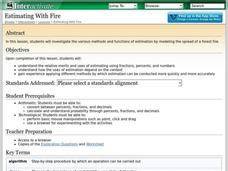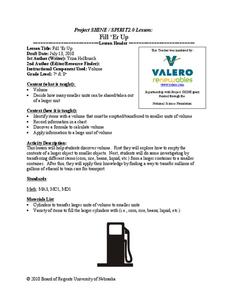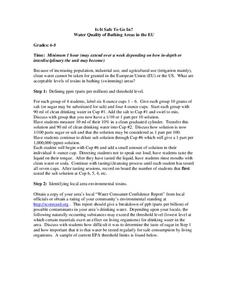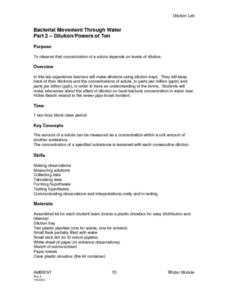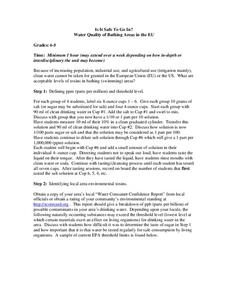Curated OER
Measuring Marvels
Students investigate measurement. For this library lesson plan, students discuss measurement, read Millions to Measure by David Schwartz, and complete a worksheet. Extra related activities are included in the lesson plan that appeals to...
Curated OER
Measuring Quantities of Gases Activity
Learners use a pipette to mix small amounts of food coloring into water. They visualize the small quantities of parts per million and parts per billion. Contrary to the title, the lesson is about liquid amounts rather than gas amounts....
Curated OER
Making Predictions About Measurement
Upper graders experiment with measurement. They estimate the length, volume, and weight of various objects, then rotate through stations making predictions concerning measurements and then testing their predictions.
Curated OER
To an Inch and Beyond!
Third graders measure in multiples of inches. In this measurement lesson, 3rd graders employ a variety of strategies to measure several items in inches.
Curated OER
Parts-Per-Million Concentration Lab
Students develop a comprehension of parts per million as a concept. They work in teams to create successive dilutions of a solution to reach a parts-per-million concentration. Students list what they think the atmosphere is made of. They...
Beyond Benign
PPM
The 15th lesson in the series of 24 helps your classes understand the ppm (part per million) unit of measure. First, scholars experiment with food coloring to determine concentrations before applying their findings to calculate...
Curated OER
What is Air?
Students investigate air by participating in a class experiment. In this matter measurement lesson, students identify air as a gas which consists of mass. Students utilize a windsock or balloon to measure oxygen and explore it's true...
Chicago Botanic Garden
Historical Climate Cycles
What better way to make predictions about future weather and climate patterns than with actual climate data from the past? Young climatologists analyze data from 400,000 to 10,000 years ago to determine if climate has changed over...
Curated OER
Measuring Marvels
Learners discover how units of measurement help people to categorize objects. For this measurement lesson, students discuss various units of measurement, use creativity to invent new possible units of measure, and learn the history of...
Shodor Education Foundation
Estimating With Fire
Watch the damage from a forest fire in this interactive simulation activity that challenges learners to estimate the burn area using different approaches. Learners are given a worksheet to track the different burn patterns and practice...
Curated OER
Target Earth
Space scientists use water displacement to determine the mass of a cubic centimeter mini meteorite, and then use it as a small-scale representative of an asteroid. They figure out the orbital velocity of an asteroid. Then they use a...
California Academy of Science
Global Climate Change and Sea Level Rise
Ice is nice, and its condition on the planet has a significant effect. Junior geoscientists experiment with ice melting in both water and on land to discover how each affect the rising sea level. This detailed instructional activity...
Curated OER
How Much is a Million?
Students discover the magnitude of the number 100. The sense of the number is developed by allowing students to experience 100 by counting it, measuring it, feeling it, and doing it, hands-on
Curated OER
Is It Safe To Go In?
Students examine acceptable levels of toxins in swimming areas. Working in groups of four, students dilute a salt or sugar solution to 1 part per 1,000,000 (ppm) solution. Students taste test their diluted liquids and record at which...
Mathematics Assessment Project
Estimating Length Using Scientific Notation
Would you rather have a million dollars or 1 x 10^6 dollars? To find the answer to this question, class members first complete an assessment task converting numbers between decimal notation and scientific notation. They then take...
Curated OER
Water Down the Drain
Did you know that leaky faucets waste $10 million worth of water? Conservationists perform an experiment and draw best-fit lines to explore how the US Geological Society determined this value.
Curated OER
How Big is a Breath?
Students demonstrate how to use math skills to measure their lung capacity. In this human biology lesson, students use a clear plastic container, measuring cup and rubber balloons to demonstrate how the lungs work. Students estimate the...
Curated OER
Fill 'Er Up
Students identify how many smaller units can be found in a later unit. In this geometry lesson, students calculate the volume and the transfer amount to a smaller unit. They solve real life problems using the formula for volume.
Curated OER
Is It Safe to Go In? Water Quality of Bathing Areas in the EU
Using your senses, apprehend the effects of contaminants in water. With a global focus, young scientists conduct a safe experiment by tasting sugar and salt water with different dilutions. After reviewing threshold limits, learners write...
Curated OER
Bacterial Movement Through Water Part 2- Dilution/Powers of Ten
Learners make dilutions using dulution trays. They keep track of their dilutions and the concentrations of solute, to parts per million (ppm) and parts per billion (ppb), in order to have an comprehension of the terms. Students make...
Curated OER
How Small is It?
Young scholars better understand what a concentration of one part per million means through activities. Students discuss "Maximum Contaminant Level" of a toxic in the water. They measure the classroom to find out how many cubic...
Curated OER
Asthma
Students experience what it feels like to strain for air in order to empathize with people who have asthma. They create a simple model of the respiratory system to measure the effect of narrowed airway channels.
Curated OER
Is It Safe To Go In? Water Quality of Bathing Areas in the EU
Pupils complete an experiment on water to study water quality. In this water quality lesson, students complete a taste test experiment about chemicals in water. Pupils then study their local water environments and recorded toxins....
Utah Education Network (UEN)
The Pasture and the Fence
Beginning geometers use tiles and grid paper to draw and calculate perimeter and area. Rectangles of different sizes are created and then measured to build understanding. The one-inch grid sheet referenced is attached.









